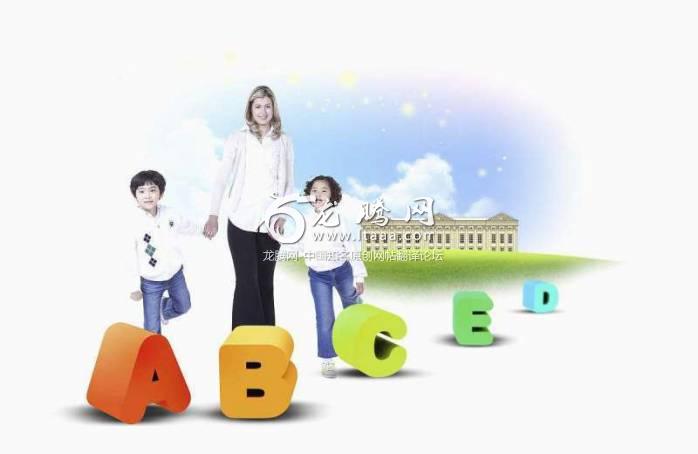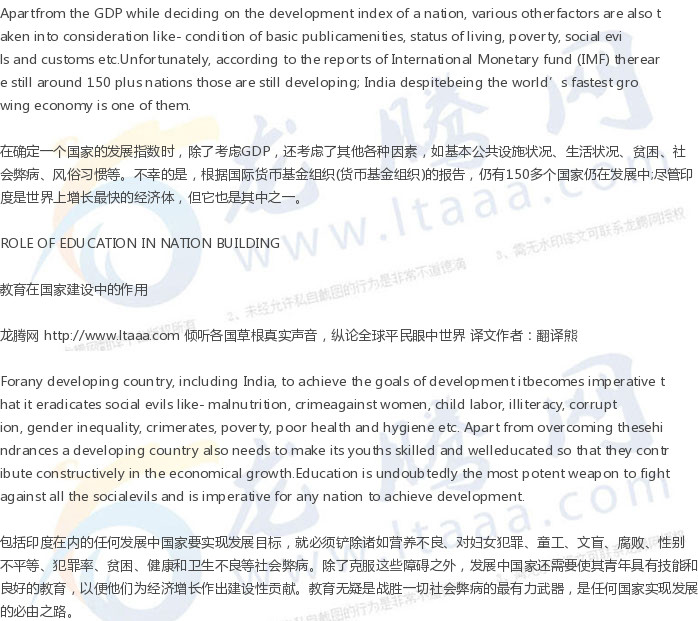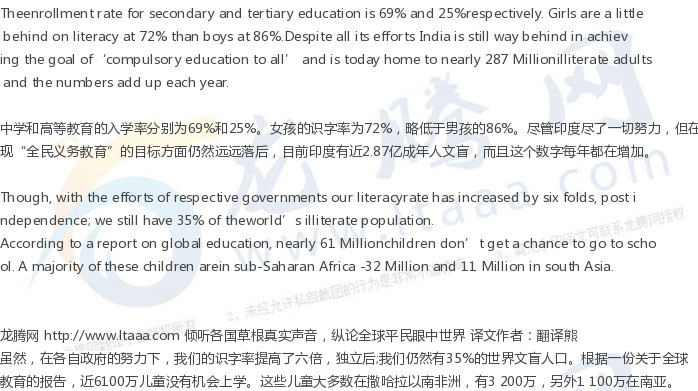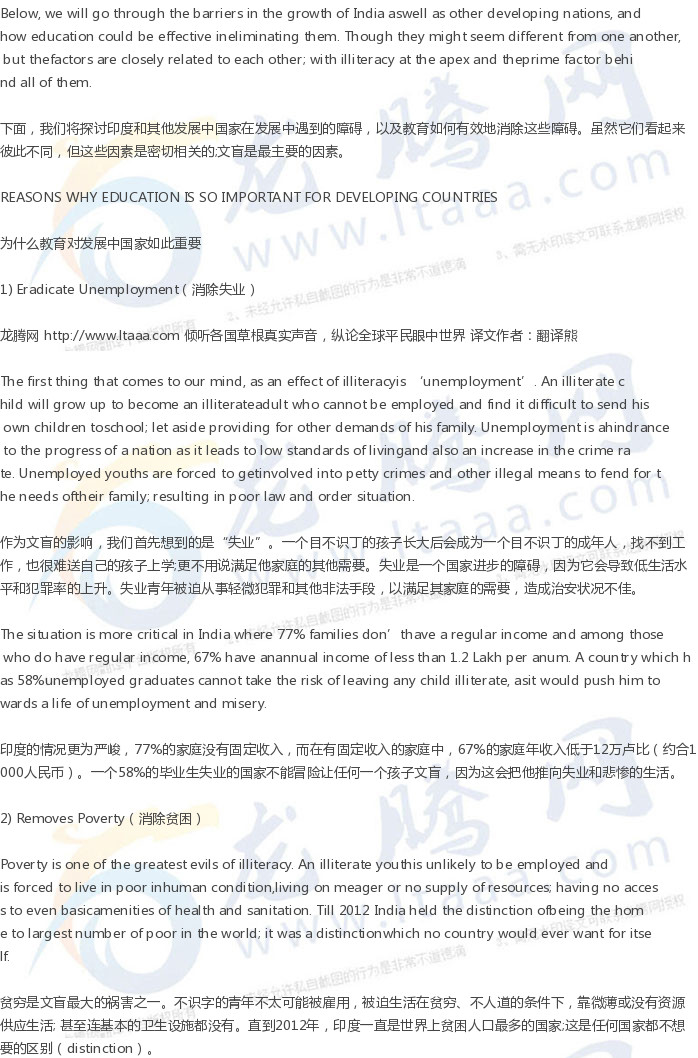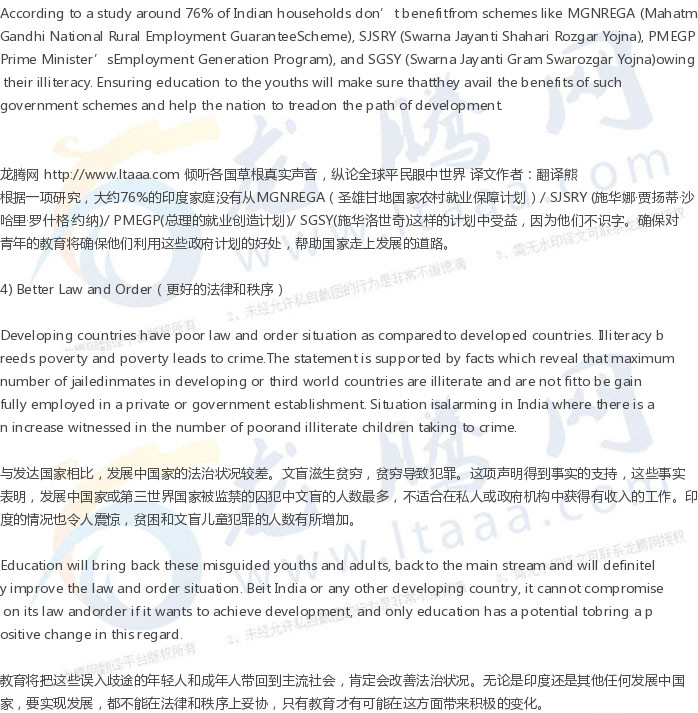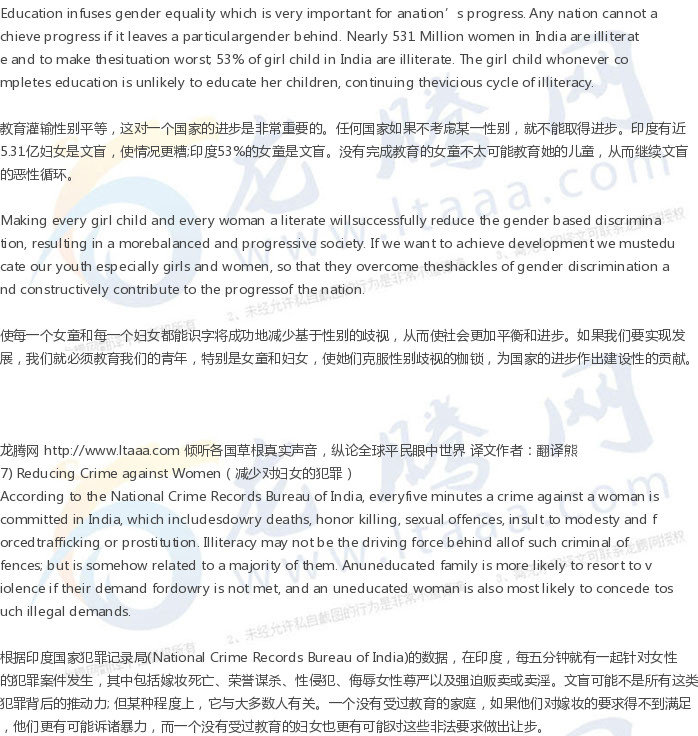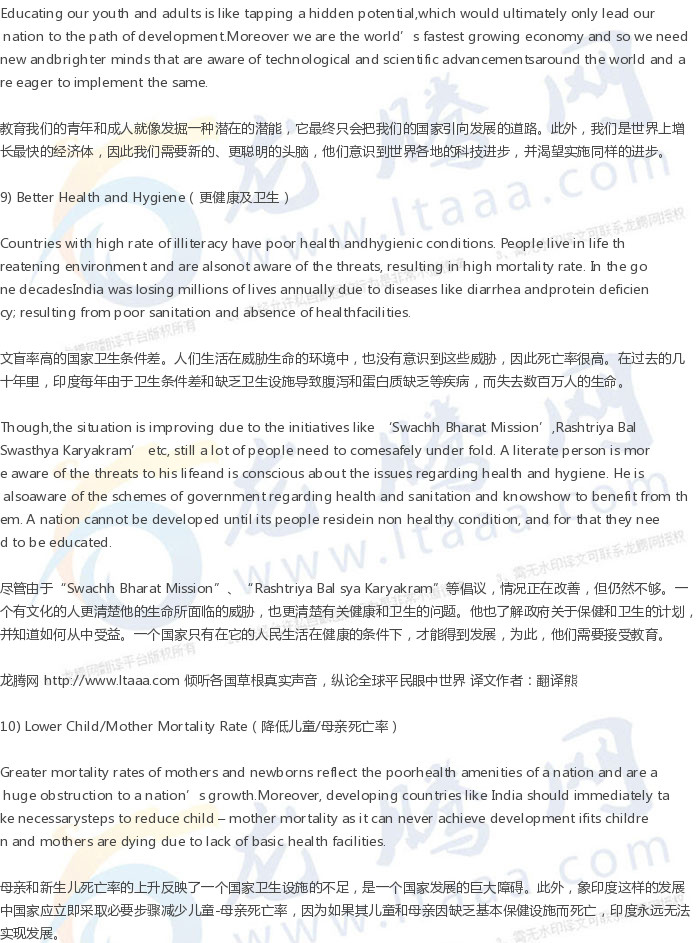教育在我们生活中的重要性 [美国媒体]
正如光的重要性是通过体验黑暗而得到更好的理解一样;教育的重要性也可以通过深入探讨教育的缺乏来更好地理解。“为什么教育在我们的生活中如此重要?”——也许,一个从未上过学、受过文盲之苦的文盲能够回答这个问题。他知道学校的重要性,也知道学校能给一个人的生活带来什么样的改变。
ARTICLE ON IMPORTANCE OF EDUCATION INOUR LIFE
教育在我们生活中的重要性
Introduction
As the importance of light is better understood by experiencing darkness;so is the importance of education can be better understood by dwelling into thelack of it. Perhaps, an illiterate person who has never been to school and whohas faced the curse of illiteracy could answer the question- “Why is educationso important in our life?” better. He knows the importance of schools and whatchange could it brings to a person’s life.
介绍:
正如光的重要性是通过体验黑暗而得到更好的理解一样;教育的重要性也可以通过深入探讨教育的缺乏来更好地理解。“为什么教育在我们的生活中如此重要?”——也许,一个从未上过学、受过文盲之苦的文盲能够回答这个问题。他知道学校的重要性,也知道学校能给一个人的生活带来什么样的改变。
Education builds individuals, educated individuals build bettersocieties, and better societies build great nations. From the most underdeveloped third world countries (like Togo and Madagascar) to the world’ssuperpowers (USA, Russia, China); their only hope to success and developmentlies in education and providing compulsory education to all.
Below we will go through the importance of education in India aswell as other developing countries, understanding its implications as well asimportance.
教育造就个人,受过教育的个人造就更好的社会,而更好的社会造就伟大的国家。从最欠发达的第三世界国家(如多哥和马达加斯加)到世界超级大国(美国、俄罗斯、中国); 他们成功和发展的唯一希望在于教育和普及义务教育。
IMPORTANCE OF EDUCATION IN INDIA AND OTHER DEVELOPINGCOUNTRIES
教育在印度和其他发展中国家的重要性
Witha Gross Domestic Product per capita (GDP) of 1963.55 USD (United States Dollar)as recorded in 2017; India is recognized as a developing country. The GDP percapita of a Nation roughly measures the amount of money an individual in thatnation makes in a financial year. The GDP per capita of a country is obtainedby dividing the Gross Domestic Product (GDP or the amount of money a countrymakes annually) by its population. Though, there is no fixed criterion todecide on whether a country is under developed, developing or developed; theGDP per capita of a country compared with others can be a reference point.
2017年人均国内生产总值(GDP)为1963.55美元;印度是公认的发展中国家。一个国家的人均国内生产总值粗略地衡量了该国个人在一个财政年度的收入。一个国家的人均国内生产总值是用国内生产总值(GDP)除以人口得出的。但是,一个国家是欠发达、发展中国家还是发达国家,并没有固定的标准;不过一个国家的人均GDP与其他国家相比可以作为一个参考点。
PRESENT STATE OF EDUCATION IN INDIA AND OTHER DEVELOPINGCOUNTRIES
印度和其他发展中国家的教育现状
ThoughIndia has a high enrollment rate at Primary section- 95% according to 2011census; the dropout rate after the primary education is also alarming withnearly half of those enrolled for primary education, dropping out at the age of14 and the other half unable to read or write or perform basic mathematicalcalculations.
尽管印度的小学入学率很高——根据2011年的人口普查,有95%入学率。小学毕业后的辍学率依然令人担忧,近一半的小学入学学生在14岁时辍学,另外一半人不能读写或进行基本的数学计算。
Aroundthe globe, 750 Million people are unable to read and write, of which womenconstitute two thirds and all of them reside in the third world countries orthe developing countries.
The only hope of a underdeveloped and developing nation lies ineducating its children, youth and adults, irrespective of their caste, religionor gender.
全球有7.5亿人不能读写,其中妇女占三分之二,她们全部居住在第三世界国家或发展中国家。不发达和发展中国家的唯一希望在于教育其儿童、青年和成人,不论其种姓、宗教或性别。
What Education can Change in India and other Developing Nations
(Role of Education in India and Other Developing Countries)
教育可以改变在印度和其他发展中国家(教育在印度和其他发展中国家中的角色)
Education has the potential to change the course of a nation; anation whose pupils are educated and skilled is most likely to achieve itstargeted economical growth and be known as a developed nation. An educatednation successfully removes any hindrances to its growth, and constantlystrives to achieve sustainable development.
教育有可能改变一个国家的进程;一个国家的学生受教育和技能是最有可能实现其目标的经济增长,并被视为发达国家。一个受过良好教育的国家成功地排除了任何阻碍其发展的障碍,并不断努力实现可持续发展。
Nigeria has overtaken India as a country with largest number ofpoor, but India is still the second in the list. India’s poverty is a result ofilliteracy and one of its major effect- unemployment. In India nearly 70.6Million people still live in abject poverty while Nigeria has 87 Million. Theonly hope of getting these people out of the vicious cycle of poverty is, byeducating them and their children. More literacy means high employability whichmeans better living conditions and eradication of poverty.
尼日利亚已经取代印度成为世界上贫困人口最多的国家,但印度仍然是世界上贫困人口第二多的国家。印度的贫穷是文盲造成的,其主要影响之一是失业。在印度,将近7060万人仍然生活在赤贫中,而尼日利亚有8700万人。让这些人摆脱贫困恶性循环的唯一希望是教育他们和他们的孩子。更多的识字率意味着更高的就业能力,这意味着更好的生活条件和消除贫困。
3) Effectiveness of Government Welfare Schemes(政府福利计划的成效)
The government of developing countries from time to time inducesmany welfare schemes for its citizens. Schemes like skill development,providing loans for establishing small businesses as well as other employmentschemes; can only be availed if the person has the required minimumqualification. Like in India, schemes like ‘Prime Minister Rozgar Yojna’ or‘Skill Development’ can only be availed if one has passed at leastmatriculation. Millions are in need but can not avail the benefits of suchschemes owing to their illiteracy.
发展中国家政府不时地为其公民引入许多福利计划。技能发展、为开办小型企业提供贷款以及其他就业计划;只有具备最低资格的人才可申请。和印度一样,Rozgar Yojna或“技能发展”(Skill Development)等项目只有在至少通过了大学入学考试的情况下才能发挥作用。数以百万计的人需要这些计划,但由于他们不识字而无法利用这些计划的好处。
5) Eradicates Casteism(根除印度种姓制度)
Casteism or caste based discrimination is one of the majorhindrances that India faces on the path of sustainable development. A societywhich discriminates among its peers on the basis of their caste, creed, coloror religion can never achieve development and will forever remain entangled inthe web of poverty, poor resources and hatred. One of the main factors behindthe caste based discrimination and practicing orthodox customs is illiteracy.
种姓歧视是印度在可持续发展道路上面临的主要障碍之一。一个基于种姓、信仰、肤色或宗教而歧视同类的社会是永远无法发展的,它将永远陷在贫穷、资源欠缺和仇恨的网中。种姓歧视和传统习俗背后的主要因素之一是文盲。
An illiterate person is unlikely to think rationally and is likelyto concede to false practices and orthodox customs. On the contrary, educationcan change a person’s perspective on caste discrimination and make him morelikely caste neutral and having a progressive mind set; willing to contributeproductively to the nation. Therefore, casteism can be effectivelyeradicated by education; the more people are educated the more the nationbecomes caste neutral.
一个不识字的人不太可能理性地思考,而且很可能向错误的做法和正统的习俗妥协。相反,教育可以改变一个人对种姓歧视的看法,使他更有可能保持种姓中立,拥有进步的心态;愿意为国家作出富有成效的贡献。因此,通过教育可以有效地消除种姓歧视;人们受教育程度越高,国家就越能保持种姓中立。
6) Gender Equality(男女平等)
Whileit can be said that a well educated person can also resort to violence againstwomen, but he is more unlikely to do so as compared to an illiterate person.Moreover, an educated woman knows her rights and can very well defend herselfas well as her family against any threats as compared an illiterate woman.Therefore, it is established beyond doubt that India needs to use education asa weapon to fight back crimes against women, if it wants to achieve developmentin true sense.
虽然可以说一个受过良好教育的人也可以对妇女使用暴力,但与文盲相比,他更不可能这样做。此外,一个受过教育的妇女与一个文盲妇女相比更知道她的权利,能够很好地保护自己和她的家庭免受任何威胁。因此,毫无疑问,印度如果要实现真正意义上的发展,就需要利用教育作为一种武器来反击对妇女的罪行。
8) Economical Development andStability(经济发展与稳定)
Economical growth and stability is only possible througheducation. Any developing nation has a pool of talent, which regularly getswasted due to lack of education and the absence of required educationalinfrastructure. Nearly twenty million youths graduate annually in India,in various disciplines and set out to aid to the economical development ofnation. If only we were able to educate all of those who lagged behind, what atremendous change it would have brought to our economy.
经济增长和稳定只有通过教育才能实现。任何一个发展中国家都有一个人才库,由于缺乏教育和必要的教育基础设施,人才库经常被浪费。在印度,每年有近2000万名不同学科的青年毕业,他们开始为国家的经济发展提供帮助。如果我们能够教育所有落后的人,这将给我们的经济带来多么巨大的变化。
On the other hand a literate mother is more likely to seek thehelp from a registered medical practitioner rather than going to an illegalpractitioner. She is also more aware of the nutritional needs of her new born;thereby, resulting in a decrease in infant mortality.
另一方面,有文化的母亲更有可能从注册医生那里寻求帮助,而不是去找非法医生。她也更了解新生儿的营养需求;从而降低了婴儿死亡率。
Conclusion(总结)
A nation is nothing but an amalgamation of different societies.The behavior and growth of the individual societies reflects the behavior andgrowth of the nation. An educated, well cultured and progressive society;therefore, represents a progressive nation whose pupils are happy and content.A society can be happy and progressive only when it overcomes the shackles ofpoverty, unemployment, inequality, corruption, gender inequality, economicaldisparity etc, by making all of its citizens literate and by ensuringcompulsory education for all.
Today, India is the world’s fastest growing economy and is aboutto surpass China; and looking forward to achieve sustainable development by theyear 2030 with rest of the world. A feat only possible through education and literacy.
一个国家只不过是不同社会的融合。社会个体的行为和成长反映了一个国家的行为和成长。一个受过良好教育、有文化和进步的社会;它代表了一个进步的国家,它的学生是快乐和满足的。一个社会只有通过使全体公民识字和确保人人接受义务教育,才能克服贫困、失业、不平等、腐败、性别不平等、经济不平等等的枷锁,才能幸福和进步。
今天,印度是世界上增长最快的经济体,即将超过中国;并期待与世界各国一道,在2030年前实现可持续发展。这一壮举只有通过教育和读写才能实现。
版权声明
我们致力于传递世界各地老百姓最真实、最直接、最详尽的对中国的看法
【版权与免责声明】如发现内容存在版权问题,烦请提供相关信息发邮件,
我们将及时沟通与处理。本站内容除非来源注明五毛网,否则均为网友转载,涉及言论、版权与本站无关。
本文仅代表作者观点,不代表本站立场。
本文来自网络,如有侵权及时联系本网站。
图文文章RECOMMEND
热门文章HOT NEWS
-
1
Why do most people who have a positive view of China have been to ...
- 2
- 3
- 4
- 5
- 6
- 7
- 8
- 9
- 10
推荐文章HOT NEWS
-
1
Why do most people who have a positive view of China have been to ...
- 2
- 3
- 4
- 5
- 6
- 7
- 8
- 9
- 10


